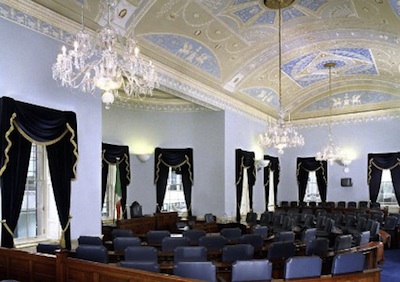
The partners in the Dublin coalition government, Fine Gael and Labour, are said to have “diverged sharply” in their attitude to the confirmation this week that a referendum is to be held to scrap the upper chamber of the Dublin parliament.
Originally modelled as an Irish version of Britain’s ‘House of Lords’, the Seanad [Senate] exercises very few real powers. Membership of the chamber is highly restricted and only available through appointment by the Taoiseach, or through rare votes by certain ‘elite’ communities of electors.
Controversially, the government has not discussed or allowed any possible reform of the Seanad, even by the Constitutional Convention which was created last year for such a task.
But as the prospect of the referendum has advanced, the reform campaign has come into increasing favour among Senators. One long-standing senator, supermarket mogul Fergal Quinn, even called for northerners and emigrants to be allowed democratic rights in the upper house in a desperate bid to shore up support.
While Taoiseach and Fine Gael leader Enda Kenny insisted both parties must throw their weight behind the campaign, Labour has allowed its TDs and Senators to declare their support for the retention of the chamber.
A succession of Labour Senators and TDs said this week that they would vote ‘No’, saying they favoured reform. The Labour politicians who say they will vote against abolition include its chief whip in the Dail Emmet Stagg, Cork South-West TD Michael McCarthy and Dublin Mid-West TD Joanna Tuffy. Senators Aideen Heyden, John Kelly, John Whelan, Susan O’Keeffe and Jimmy Harte also said they would vote to retain the chamber.
Mr Kenny, however, made it clear he expected all members of both parties to back both the referendum Bill and the subsequent campaign.
Sinn Fein Seanad Leader David Cullinane described the publication of the constitutional amendment bill as ‘premature’.
“Sinn Fein believes that the Seanad as currently constituted is deeply undemocratic and elitist. We do not believe that it can continue to function in its current form.
“However, the government has taken an ill-considered and rash approach to the question of the future of the Seanad. In recent weeks we have heard various ideas floated, before being dropped, including a high powered committee to scrutinise legislation, consisting entirely of appointees. This illustrates the desire of the government to do away with as many checks and balances as possible.
“Today the government has published legislation which will allow for a constitutional amendment to be put to the people to decide whether to abolish the Seanad or not.
“Simple abolition, without even allowing the opportunity to discuss considering reform is foolhardy.
“We have continually argued that the question of the future of the Seanad needs to be referred to the Constitutional Convention.”
“This is the appropriate place to consider whether we need a second chamber, what is the purpose of a second chamber, and what role, if any, a second chamber could usefully fulfil.”
![[Irish Republican News]](https://republican-news.org/graphics/title_gifs/rn.gif)
![[Irish Republican News]](https://republican-news.org/graphics/title_gifs/harp.gif)

